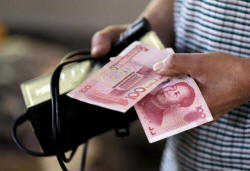|
China's new rules on yuan
transfers are not capital controls: Xinhua
 Send a link to a friend
Send a link to a friend
 [January 02, 2017]
BEIJING
(Reuters) - China's new rules on overseas currency transfers are not
capital controls, the official Xinhua news agency reported, even as some
banks told customers that purchases of foreign currency for property,
securities and life insurance were not allowed. [January 02, 2017]
BEIJING
(Reuters) - China's new rules on overseas currency transfers are not
capital controls, the official Xinhua news agency reported, even as some
banks told customers that purchases of foreign currency for property,
securities and life insurance were not allowed.
Capital outflows have been a growing concern for the government in the
past year as it attempted to put the economy back on track and keep the
currency stable without exhausting its foreign exchange reserves, which
tumbled to $3.052 trillion in November, the lowest in almost six years.
Starting in July 2017, banks and other financial institutions in China
will have to report all domestic and overseas cash transactions of more
than 50,000 yuan ($7,201), compared with 200,000 yuan previously, the
central bank said on Friday.
Banks will also need to report any overseas transfers by individuals of
$10,000 or more.
The responsibility of reporting such transactions will be assumed by
financial institutions, and there will also be no extra documentation or
official approval procedures required for companies or individuals,
Xinhua reported late on Sunday, citing Ma Jun, chief economist of the
People's Bank of China (PBOC).

The government has said its checks on transactions are meant to target
money laundering, terrorism financing and fake outbound investment
transactions, and not normal, legitimate business activities.
China's foreign exchange regulator said late on Saturday that from Jan.
1 it would step up scrutiny on individual foreign currency purchases and
strengthen punishment for illegal money outflows, although the $50,000
annual individual quota will remain unchanged.
Regulations allow Chinese nationals a foreign exchange quota of $50,000
a year.
[to top of second column] |

A customer holds a 100 Yuan note at a market in Beijing, August 12,
2015. REUTERS/Jason Lee

Since
Sunday, Bank of Shanghai and China Merchants Bank customers have been required
to fill out a new online form when applying to purchase foreign exchange through
their respective mobile banking apps.
The
form restricted foreign exchange from being used to buy overseas property,
securities, life insurance or other investment-style insurance products.
Approved uses of funds were restricted to non-investment uses including tourism,
schooling, business travel, and medical care.
Customers must also indicate how they plan to use the foreign currency and when
they plan to spend it.
Reuters was not able to reach Bank of Shanghai and China Merchants Bank for
comment due to a public holiday on Monday.
Reuters was also unable to immediately confirm if all banks in China were using
the new application form.
(Reporting by Chen Aizhu, Cheng Fang and Elias Glenn; Additional writing by Ryan
Woo; Editing by Jacqueline Wong)
[© 2017 Thomson Reuters. All rights
reserved.] Copyright 2017 Reuters. All rights reserved. This material may not be published,
broadcast, rewritten or redistributed.
 |